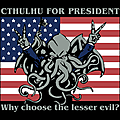 I'm not normally a great fan of Lovecraft – yes, many of the stories are well-written, and he has a lot of remarkable ideas; but the heavy reliance on "unspeakable", "unfathomable", "eldritch" and a handful of other words and ideas that seem to pop up at least once in every damned paragraph of his work is tiresome. Metaphorically, it makes my teeth ache.
I'm not normally a great fan of Lovecraft – yes, many of the stories are well-written, and he has a lot of remarkable ideas; but the heavy reliance on "unspeakable", "unfathomable", "eldritch" and a handful of other words and ideas that seem to pop up at least once in every damned paragraph of his work is tiresome. Metaphorically, it makes my teeth ache.
I think Clark Ashton Smith was actually a more skilled writer, although he also overdid it in florid stylistics, and his ideas aren't quite as remarkable (though they range over more territory, with more different moods).
But lately I managed to get addicted to an
electronic card game based on that ol' Cthulhu mythos. It's very entertaining – the game maker has had a good time designing something rather complicated and somewhat funny, complete with sanity points.
And that amusing game brought me back to Lovecraft and such... fortunately a nearby used book store,
Black Flame, has a shelf or two of Lovecraft-related books, and I bought one. It's funny to get back to his work... and funnier to see how many people online are fascinated with Cthulhu in various guises: many of them seem to want to figure it out, to find out the 'facts'.
Of course the lovely joke is... it only works as a fictional technique when less information is given, rather than more. The style really started (after Ambrose Bierce, who did something slightly different) with Robert Chamber's The Yellow King; the four stories he wrote concerned with that nonexistent play were brilliant, and the maddening lacunae and inconsistencies merely made it better.
And I'll admit: it made me want to know everything I could about that unreal object, the play that drove people mad... it's not quite like the lacunae of, say, Robbe-Grillet's Le Voyeur, but not completely different from it.
Unspeakable!...
I'm not normally a great fan of Lovecraft – yes, many of the stories are well-written, and he has a lot of remarkable ideas; but the heavy reliance on "unspeakable", "unfathomable", "eldritch" and a handful of other words and ideas that seem to pop up at least once in every damned paragraph of his work is tiresome. Metaphorically, it makes my teeth ache.
Comments